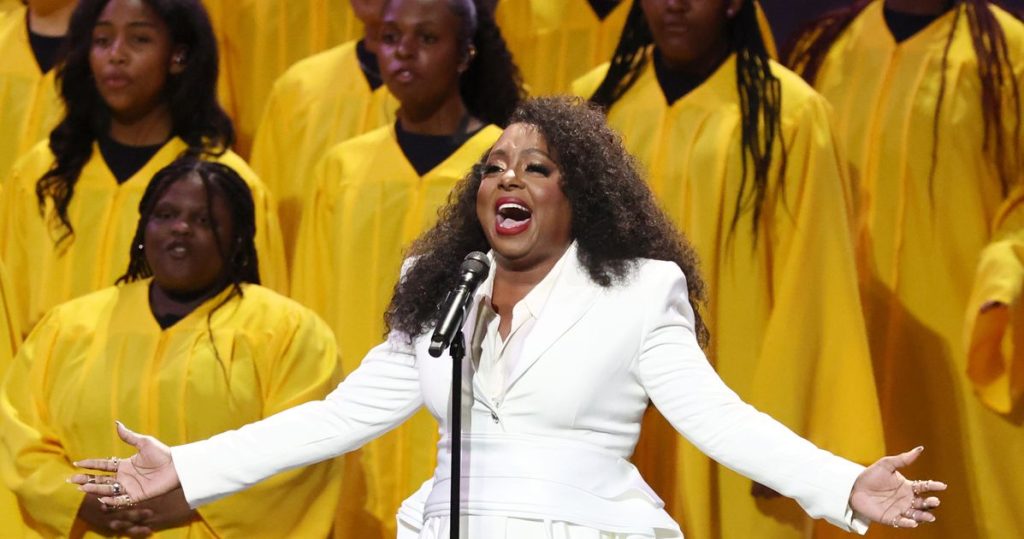The 2024 Super Bowl LIX in New Orleans became a focal point for both celebration and controversy, particularly during its pregame ceremony. Grammy-winning singer Ledisi, a native of New Orleans, delivered a powerful performance of “Lift Every Voice and Sing,” a song widely regarded as the Black national anthem. While the rendition was met with widespread admiration, it also sparked outrage among some right-wing commentators, who accused the song of being divisive and promoting segregation. These criticisms, however, profoundly missed the point of the song’s historical and cultural significance. “Lift Every Voice and Sing” is not about division but about recognizing the struggles and triumphs of Black people in America, while also inspiring hope for a more equitable future.
The backlash against the song reflects a broader cultural war over representations of Blackness and celebrations of Black culture in public spaces. Conservatives on social media, including prominent figures like former Fox News personality Megyn Kelly, argued that the song’s inclusion at the Super Bowl was inappropriate, claiming that the U.S. already has a national anthem that unites everyone. However, such arguments ignore the unique historical and ongoing struggles faced by Black Americans. As author and professor Shana Redmond explained, “Lift Every Voice and Sing” serves as a counterpoint to the absences and elisions in America’s official national anthem, “The Star-Spangled Banner,” which has been criticized for its racist and anti-Black lyrics. Redmond emphasized that the Black national anthem is not a protest song but a hymn of affirmation, perseverance, and inspiration for Black communities.
The controversy over “Lift Every Voice and Sing” was not isolated to the pregame ceremony. The 2024 Super Bowl also faced criticism for its halftime show, which featured Kendrick Lamar, a celebrated rapper and artist, alongside other prominent Black figures such as SZA, Serena Williams, and Samuel L. Jackson. The show was a vibrant celebration of Black culture, but it was quickly labeled as a “DEI halftime show” by some on social media, a term that many interpreted as a thinly veiled criticism of the event’s emphasis on diversity and Blackness. These attacks are part of a larger trend of backlash against cultural celebrations and traditions that highlight the experiences of marginalized communities, particularly under the Trump administration.
The pushback against such cultural expressions has intensified since Donald Trump took office. In a memo released last month, the Department of Defense announced that it would no longer observe cultural awareness months, such as Black History Month, following Trump’s executive actions targeting diversity, equity, and inclusion practices. The memo claimed that such efforts “divide the force” and erode camaraderie. However, as Erica Foldy, a professor at New York University, has argued, reflecting on Black history is not divisive—it is essential. For centuries, Black history was erased from mainstream narratives, and Black History Month has played a crucial role in raising visibility about the contributions of Black people to American society, both in the past and present.
The debate over “Lift Every Voice and Sing” at the Super Bowl also highlights the importance of understanding the song’s origins and history. Written by James Weldon Johnson in 1899 as a poem, the song was first performed publicly in 1900 by a group of schoolchildren in Jacksonville, Florida. Johnson’s brother, John Rosamond Johnson, composed the music. Over time, the song became a rallying cry for the civil rights movement and was officially adopted as the Black national anthem by the NAACP in 1919, more than a decade before “The Star-Spangled Banner” became the official U.S. national anthem in 1931. Its lyrics, which speak of faith, hope, and resilience, continue to resonate deeply with Black communities today.
The performance of “Lift Every Voice and Sing” at the Super Bowl was not just a musical moment; it was a powerful statement of affirmation and resistance. As Gerald Early, a professor of African and African-American Studies, noted, the song should be framed as a celebration of Black identity and perseverance, not as a source of division. Ledisi, the singer who performed the song, echoed this sentiment, stating that music is a unifying force that transcends differences. Her performance served as a reminder of the enduring relevance of “Lift Every Voice and Sing” and the importance of preserving Black cultural traditions in American life. At a time when cultural wars over race and identity continue to escalate, the song remains a testament to the strength and resilience of Black communities, offering hope for a future where equality and justice are not just ideals but realities.









